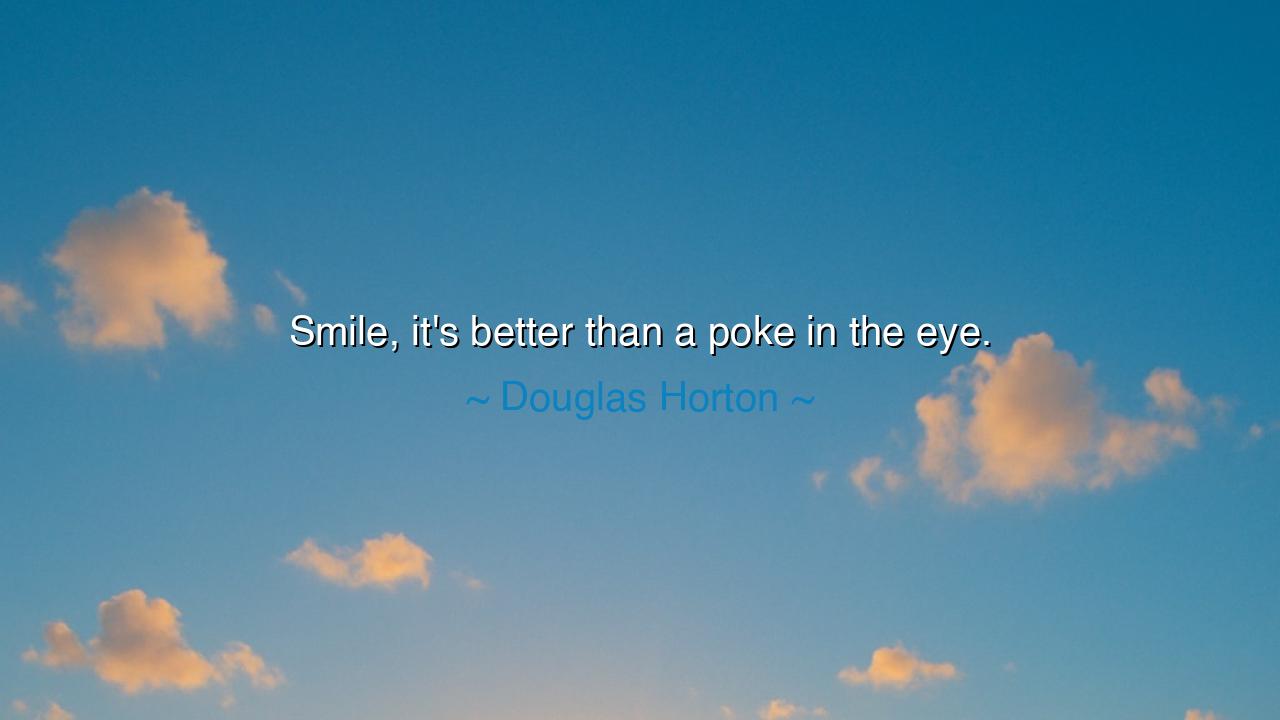
Smile, it's better than a poke in the eye.






Hear the words of Douglas Horton, spoken with wit yet bearing an undercurrent of timeless wisdom: “Smile, it’s better than a poke in the eye.” At first they seem playful, almost careless in their humor, yet within them lies a teaching older than laughter itself. Horton reminds us that even the smallest act of smiling is preferable to bitterness, complaint, or injury. A smile may not solve every hardship, but it lightens the burden, whereas resentment or despair pierces the spirit like a thorn.
The origin of this truth lies in the art of perspective. The phrase compares the choice to smile with the experience of being poked in the eye, an image of pain, sudden shock, and helplessness. Life often offers us trials, large and small, that we cannot escape. But though we may not always control what befalls us, we can choose how we meet it. To smile is to claim a measure of victory over suffering, to transform what could embitter us into an opportunity for resilience. Horton cloaks this profound truth in humor, for laughter, like smiling, is itself a balm to hardship.
History gives us many who have embodied this teaching. Consider the example of Winston Churchill, who in the darkest hours of the Blitz, when London burned and the people trembled, still found it within himself to joke, to laugh, to smile before his countrymen. He knew that despair was contagious, but so too was courage. His grin, even amidst rubble and smoke, told his people: we will endure. By smiling, he prevented the “poke in the eye” of despair from blinding his nation.
Or look to the life of Helen Keller, who was robbed of sight and hearing, yet carried within her a radiant smile that inspired all who met her. She could easily have been consumed by the pain of her condition, but instead she chose joy. Her smile was not denial of suffering, but a weapon against it. It proved that while the world may wound us, it cannot steal our dignity if we refuse to surrender it. In her, Horton’s words are given flesh: smiling is always better than dwelling on the pain, always better than bowing to life’s cruel strikes.
The meaning of the quote is therefore both simple and profound. A smile is not merely a social gesture—it is an act of defiance, of strength, of perspective. It says, this moment may be hard, but I am not undone. The poke in the eye is symbolic of life’s many unexpected hurts; the smile is symbolic of our ability to rise above them. One cannot avoid every wound, but one can choose whether to live wounded or to live with hope.
The lesson for us is clear: when faced with disappointment, failure, or insult, choose first to smile. Do not let bitterness become your companion, for bitterness blinds more surely than a poke in the eye. A smile steadies the heart, eases the spirit, and softens even those who stand against you. In choosing joy over despair, you claim a strength greater than circumstance.
Practical action must follow. Begin by cultivating gratitude in the small things. When hardship comes, pause and smile—not to deny the pain, but to refuse it dominion over you. Smile at strangers, for you know not what burdens they carry. Smile at friends and family, for in that small act you remind them they are not alone. And when life seeks to wound you, remember Horton’s wisdom: the eye may be poked, but the spirit can still shine with joy.
Thus the teaching is sealed: a smile is the simplest, most powerful shield against life’s injuries. It is free, it is universal, it belongs to all. Douglas Horton cloaked a great truth in humor: better to smile than to surrender to pain. So let us live with this wisdom, smiling even in trial, for in doing so we prove that the heart is stronger than the blows of fate.






AAdministratorAdministrator
Welcome, honored guests. Please leave a comment, we will respond soon